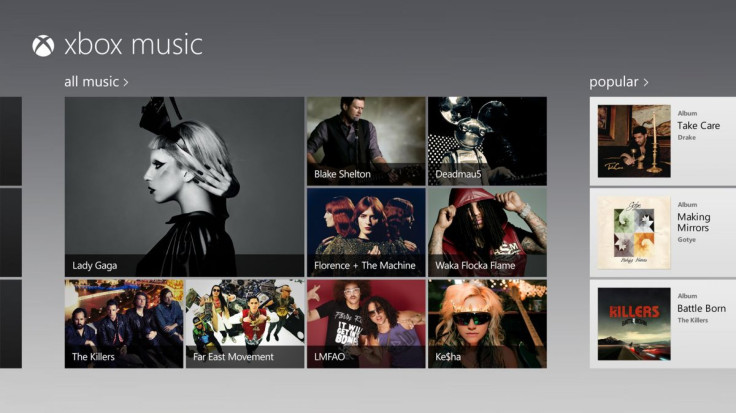Microsoft Xbox Enters The Music Streaming Business
Is the famously territorial tech giant finally abandoning DRM?

Microsoft (Nasdaq: MSFT) announced the launch of its brand-new music-streaming service on Sunday night, called Xbox Music, which is the Redmond, Wash.-based company's first attempt to rival today’s major music services such as Spotify, Pandora and Apple’s (Nasdaq: AAPL) iTunes.
Microsoft is calling the service Xbox Music to emphasize its relation with the company's popular Xbox 360 video game console, a device Microsoft has been aggressively rebranding as a home-entertainment system to extend its use and reach beyond games.
Xbox Music is set to launch this Tuesday on the Xbox 360, and the service will reportedly come pre-installed on all Windows 8 tablets and computers, as well as Windows Phone 8 smartphones. Microsoft added that Xbox Music will become available on additional platforms after the initial launch—a sharp break from the tradition it first established with its ill-fated Zune, the company’s five-year attempt to create an mp3 player and digital media store to rival Apple’s iPod devices and iTunes service.
“Whether it’s music you’ve purchased on your smartphone, a music app on your tablet, listening to songs through the living room TV or turning to Internet radio on your PC at work, the music you love is scattered across different services,” Microsoft said in its statement. “Enjoying music today requires too much work.”
In an effort to become successfully platform agnostic, Microsoft is thus offering Xbox Music as an amalgamation of the three most popular forms on digital music consumption today: streaming, subscription-based channels or virtual radio stations, and direct download. Today, consumers must juggle between the major players in the digital music space to optimize each of their services—choosing Spotify for streaming a vast library of music, but diverting to the iTunes platform when a particular song can't be found, or to avoid disruptions by advertisements, for instance.
To appeal to the different types of music consumption, Xbox Music will offer three separate tiers of its service, starting with a free, ad-supported service to stream on Windows 8 devices similar to Spotify. Users have a choice to upgrade to a $9.99/month subscription, which allows for ad-free playback as well as availability on Windows Phone 8 devices and the Xbox 360 console itself. And finally, Microsoft is introducing a new Xbox Music Store with a paid cloud storage service similar to the iTunes Match service to be introduced post-launch.
Microsoft has been hesitant to specify what additional devices it plans to expand the Xbox Music service to in the coming months, but the fact that the tech giant is leaving the question open for consideration at all is indicative of a sea-change in its formerly barrier-friendly product design mentality. Speaking to the tech business website GigaOM about some of its post-Zune lessions, Microsoft’s director of Xbox Music industry relations Christina Calio said of the new product: “It’s about the service, not the device.”
Establishing firm borders within a tech ecosystem is not without its risks, after all. Zune’s entire failure as a rival to Apple’s celebrated iTunes/iPod pairing was the fact that it never managed to attracted a large enough audience to warrant such exclusivity. And preventing consumers from seeking out the best possible service based on intellectual property warrants on their device only risks alienating them whenever something doesn’t work as well as they’d hoped, as Apple’s recent iOS 6 maps debacle shows. With territorial companies like Apple and Microsoft even bowing to critics demands to loosen restrictions on their digital rights management, the transformation of products into services may actually be a boon to many an advocate of free and open technology.
Xbox Music will debut on Tuesday, October 16th on the Xbox 360, and become available to other Windows 8 and Windows Phone 8 devices when the operating system launches on October 26th.
Microsoft stock rose slightly Monday morning, peaking at $29.49 in late morning trading.
© Copyright IBTimes 2024. All rights reserved.






















